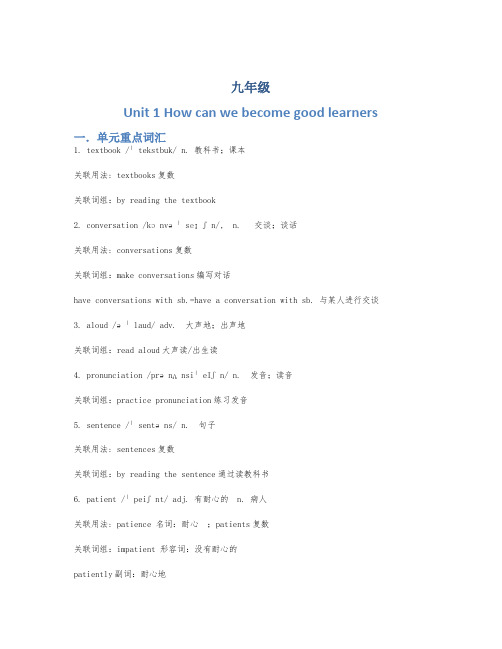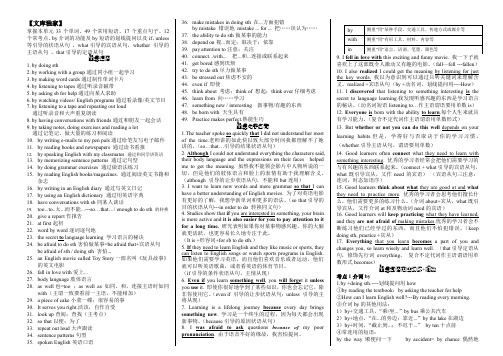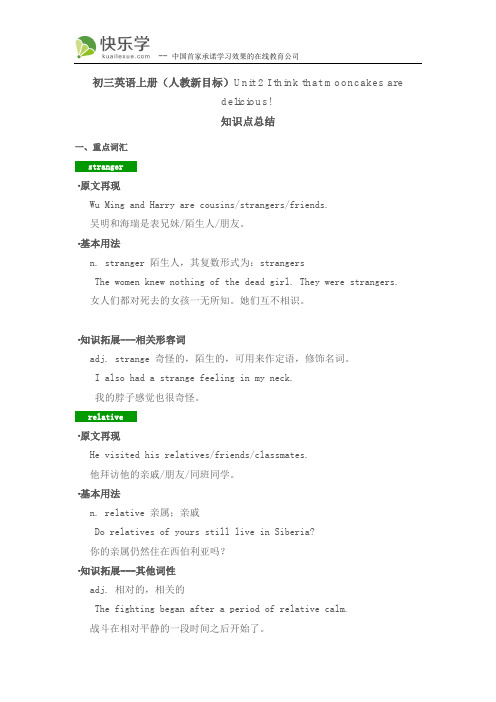新目标英语九年级上册全册知识点
人教版新目标初三英语九年级第一单元单词语法知识点总结

九年级Unit 1 How can we become good learners一.单元重点词汇1.textbook /ˈtekstbuk/ n. 教科书;课本关联用法: textbooks复数关联词组:by reading the textbook2.conversation /kɔnvəˈs eɪʃn/, n. 交谈;谈话关联用法: conversations复数关联词组:make conversations编写对话have conversations with sb.=have a conversation with sb. 与某人进行交谈3.aloud /əˈlaud/ adv. 大声地;出声地关联词组:read aloud大声读/出生读4.pronunciation /prənʌnsiˈeIʃn/ n. 发音;读音关联词组:practice pronunciation练习发音5.sentence /ˈsentəns/ n. 句子关联用法: sentences复数关联词组:by reading the sentence通过读教科书6.patient /ˈpeiʃnt/ adj. 有耐心的 n. 病人关联用法: patience 名词:耐心;patients复数关联词组:impatient 形容词:没有耐心的patiently副词:耐心地be patient with sb.对某人有耐心be patient of sth.对某事能容忍have (no) patience with…对…(没)有耐心lose patience with 对…失去耐心out of patience 没有耐心7.expression /ikˈspreʃn/ n. 表达(方式);表示关联用法:expressions复数关联词组:facial expressions 面部表情8.discover /dIˈskʌvə (r)/ v. 发现;发觉关联用法:discovery 名词:发现9.secret /ˈsi:krət/ n. 秘密;adj. 秘密的;保密的关联用法:secrets复数关联词组:in secret秘密地;keep a secret保密;a secret plan秘密的计划10.look up (在词典,参考书中或通过电脑)查阅;抬头看11.fall in love with 爱上;与⋯⋯相爱12.grammar /ˈgræmə (r)/ n. 语法关联词组:in grammar在语法方面13.repeat /riˈpi:t/ v. 重复;重做关联用法:secrets复数关联词组:repetition名词:重复14.note /nəut/ n. 笔记;记录 v.注意;指出关联用法:notes复数关联词组:please note 清注意;take notes记笔记15.pal /pæl/ n.朋友;伙伴关联词组:penpal笔友16.physics /ˈfiziks/ n. 物理;物理学关联单词:adj. 物理的;身体的;物质的;根据自然规律的,符合自然法则的关联词组:Space Physics 空间物理学物理空间空间物理17.chemistry /ˈkemistri/ n. 化学关联词组:Organic Chemistry 有机化学18.memorize /ˈmeməˌraɪz/ v 记住;记忆关联单词:memory n.记忆关联用法:过去式 memorized过去分词 memorized现在分词 memorizing第三人称单数memorizes典型例句:Have you memorized your lines for the play yet?你记住剧本中的台词了吗?19.pattern /ˈpætn/, /ˈpætən/ n.模式;方式20.pronounce /prəˈnaʊns/ v. 发音关联用法:过去式 pronounced过去分词 pronounced现在分词pronouncing第三人称单数 pronounces关联词组:Pronounce correctly 发音正确正确发音典型例句:I can not pronounce correctly 我不能正确发音21.increase /Inˈkri:s/ v. 增加;增长关联用法:过去式 increased过去分词 increased现在分词 increasing复数 increases第三人称单数 increasesn. 增加;增多;增长关联词组:increase by 增加了;按…增长on the increase 正在增加,正在增长22.speed /spi:d/ n.速度 v.加速关联单词:speeding超速关联用法:过去式 sped或speeded过去分词 sped或speeded现在分词 speeding关联词组:speed up 加速加快速度使加速加快speed limit 速度限制时速限制限速最高车速23.partner /ˈpa:(r)tnə (r)/ n. 搭档;同伴24.born /bɔːn/ v.出生 adj.天生的关联词组:be born with 天生具有born yesterday 乳臭未干典型例句:Swift was born in 1667.斯威夫特生于1667年。
英语人教新目标九年级全一册used to 的用法

在他很富有。
Used to 的句型变化
1.肯定句:Sb. used to… 如:He used to play basketball
after school. 他过去常常放学后打篮球。 2.否定句:Sb. didn’t use to…
如:She didn’t use to have long hair. 她过去不留长发。
3.一般疑问句:Did sb use to …? 如:Did you use to play the piano? 你过去常常弹钢琴吗? 4.反义疑问句:如果陈述部分为肯定 句,附加疑问部分用 didn’t,反之用
did. 如:He didn’t use to drink , did he? 他过去不经常喝酒,对吗? 注意:在借助助动词did 构成的疑问 句或否定句中,used 要变为原型use.
morning. 他习惯于早上跑步。
典型例题
1.He used to ___to school late ,but now he
doesn’t .( ) A
A. go
B. going
C. went
D. goes
2.He___like English , but now he likes it very much. ( ) B
在正式英语中,否定形式常用used not to ,一般疑问句常把used提到主 语前,反义疑问句的附加疑问部分 常用used / usedn’t. 如:They used not to allow shops to be open on Sundays. 他们以前不允许商店在星期天营业。
相似短语辨析
Used to 是固定结构,意为“过去常常,过去曾经(存在)”,表示 过去某种习惯性、经常性的动作或过去存在的某种状态,暗含现在 已不再发生或不存在之意。主语可以是各种人称,用于过去时态, 其后跟动词原形。
2020人教新目标版九年级英语上unit1单元知识点(短语+句型+重难点句子+语法)

【文库独家】掌握本单元33个单词、49个常用短语、17个重点句子、12个常考点。
by介词的功能及by短语的划线提问以及if、unless 等引导的状语从句,what引导的宾语从句,whether 引导的主语从句,that引导的定语从句重点短语1.by doing sth2.by working with a group通过同小组一起学习3.by making word cards通过制作单词卡片4.by listening to tapes通过听录音磁带5.by asking sb for help通过向某人求助6.by watching videos/ English programs通过看录像/英文节目7.by listening to a tape and repeating out loud通过听录音和大声重复朗读8.by having conversations with friends通过和朋友一起会话9.by taking notes, doing exercises and reading a lot通过记笔记、做大量的练习和阅读10.by writing e-mails to my pen pals通过给笔友写电子邮件11.by reading books and newspapers 通过读书看报12.by speaking English with my classmates 通过和同学讲英语13.by memorizing sentence patterns 通过记句型14.by doing grammar exercises 通过做语法练习15.by reading English books/magazines. 通过阅读英文书籍和杂志16.by writing in an English diary 通过写英文日记17.by using an English dictionary 通过用英语字典18.have conversations with sb同某人谈话19.too...to..太...而不能...---so…that…/ enough to do sth 的转换20.give a report作报告21.at first起初22.word by word逐词逐句地23.the secret to language learning 学习语言的秘诀24.be afraid to do sth害怕做某事=be afraid that+宾语从句be afraid of sth / doing sth 害怕…25.an English movie called Toy Story一部名叫《玩具故事》的英文电影26.fall in love with爱上...27.body language肢体语言28.as well也=too ;as well as 如同、和,连接主语时如同with(主谓一致要看前一主语,不能相加)29. a piece of cake小菜一碟;很容易的事30.It serves you right.活该,自作自受31.look up查阅;查找(主考点)32.so that以便;为了33.repeat out loud大声跟读34.sentence patterns句型35.spoken English英语口语36.make mistakes in doing sth 在...方面犯错by mistake 错误地mistake … for …把……误认为……37.the ability to do sth做某事的能力38.depend on视...而定;取决于;依靠39.pay attention to注意;关注40.connect...with... 把...和...连接或联系起来41.get bored感到厌烦42.try to do sth尽力做某事43.be stressed out焦虑不安的44.even if 即使45.think about 考虑;think of 想起;think over仔细考虑46.learn from 向……学习47.something new / interesting 新事物/有趣的东西48.be born with 天生具有49.Practice makes perfect.熟能生巧重点句子必背1.The teacher spoke so quickly that I did not understand her mostof the time.老师讲的如此快以致大部分时间我都理解不了她讲的。
初中英语人教新目标九年级全一册Grammar最终版形容词与副词课件

forget the days we spent together. ( )
C
A.always B.often
C.never
ually
考点3 形容词、副词的比较等级
形容词、副词有原级、比较级、最高级之分,通常 as...as 是原级的标志, than,much,a little 等是比较级的标志, the,in,all,among,one of 等是最高级的标志。
足语
宾语后作宾语补足语
例句
She is a beautiful girl. 她是一个漂亮的女孩。 I have something important to say. 我有重要的事情要说。
It’s very cold today. 今天非常冷。
You must keep the classroom clean. 你必须保持教室干净。
1.形容词、副词比较级、最高级的构成 (1)规则变化
1. 规则变化
taller harder
词尾变化
tallaersgt原ehr级arwdiedset比r级较
最高 级
largtbaeilglshtgaewrrdihdoetstter
单音节词在词尾加-er(比较级)或-
bigglfeaarstgtteehwroiwdtteeetstter
week-weekly day-daily
…
表示大洲与 国家的名词
-en/-y -ful -y -less -n
……制成的 ……般的 ……的 有……的
……的
不……的 无……的 ……的 ……人的
wood-wooden sand-sandy care-careful
beauty-beautiful luck-lucky
新目标九年级英语上重点内容(Unit1-4)

新目标九年级英语上重点内容(Unit1-4) Unit 1-4Unit 1: FriendsIn Unit 1, students will learn about friendship and interpersonal relationships. The key topics covered in this unit include introducing and describing friends, talking about their hobbies and interests, and discussing how to make friends. Here is an overview of the main points covered in Unit 1:1.Vocabulary: Students will learn words and phrases related to friendship, such as friend, best friend, acquaintance, and so on. They will also learn vocabulary related to hobbies and interests, such as playing sports, reading books, and listening to music.2.Grammar: The grammar focus of this unit is on the present simple tense and the present continuous tense. Students will learn how to use these tenses to describe their daily routines and activities.3.Speaking and Listening: Students will engage in various speaking and listening activities to practice their communication skills. They will have conversations with their classmates about their friends and hobbies. They will also listen to dialogues and interviews to improve their listening comprehension.4.Reading and Writing: Students will read texts about friendship and write short paragraphs or essays about their own friends and hobbies. They will practice their reading comprehension skills and learn how to express their ideas in writing.Unit 2: School LifeUnit 2 focuses on school life and the daily routines of students. The key topics covered in this unit include talking about school subjects, describing school facilities, discussing school rules, and describing daily routines. Here is an overview of the main points covered in Unit 2:1.Vocabulary: Students will learn words and phrases related to school subjects, such as math, English, science, and so on. They will also learn vocabulary related to school facilities, such as classroom, library, playground, etc.2.Grammar: The grammar focus of this unit is on the past simple tense and the present perfect tense. Students will learn how to use these tenses to talk about past events and experiences.3.Speaking and Listening: Students will engage in conversations about their school life and daily routines. They will work in pairs or groups to discuss their favorite subjects, school activities, and school rules. They will also listen to dialogues and interviews to improve their listening skills.4.Reading and Writing: Students will read texts about school life and write short paragraphs or essays about their own school experiences. They will practice their reading comprehension skills and learn how to express their ideas in writing.Unit 3: TravelUnit 3 focuses on travel and different modes of transportation. The key topics covered in this unit include talking about travel destinations, describing travel experiences, discussing means of transportation, and understanding travel information. Here is an overview of the main points covered in Unit 3:1.Vocabulary: Students will learn words and phrases related to travel and transportation, such as airplane, train, bus, ship, etc. They will also learn vocabulary related to travel destinations, such as tourist attractions, famous landmarks, etc.2.Grammar: The grammar focus of this unit is on the future simple tense and the present continuous tense. Students will learn how to use these tenses to talk about future travel plans and describe ongoing actions.3.Speaking and Listening: Students will engage in conversations about travel and transportation. They will discuss their travel experiences and future travel plans. They will also listen to dialogues and travel announcements to improve their listening comprehension skills.4.Reading and Writing: Students will read texts about different travel destinations and write short paragraphs or essays about their own travel experiences. They will practice their reading comprehension skills and learn how to express their ideas in writing.Unit 4: HealthUnit 4 focuses on health and well-being. The key topics covered in this unit include talking about personal health habits, describing symptoms of illness,discussing healthy lifestyles, and understanding health advice. Here is an overview of the main points covered in Unit 4:1.Vocabulary: Students will learn words and phrases related to health and well-being, such as exercise, diet, sleep, etc. They will also learn vocabulary related to symptoms and illnesses, such as headache, fever, cough, etc.2.Grammar: The grammar focus of this unit is on the imperatives and the modal verbs. Students will learn how to give health advice and express necessity using these grammatical structures.3.Speaking and Listening: Students will engage in conversations about health and well-being. They will discuss their personal health habits, give and receive health advice, and talk about their experiences with illnesses. They will also listen to dialogues and health-related discussions to improve their listening comprehension skills.4.Reading and Writing: Students will read texts about healthy lifestyles and write short paragraphs or essays about their own health habits and experiences. They will practice their reading comprehension skills and learn how to express their ideas in writing.ConclusionThe above summary provides an overview of the key topics and points covered in Units 1-4 of the New Target 9th Grade English textbook. These units focus on friendship, school life, travel, and health. By learning the vocabulary, grammar, speaking, listening, reading, and writing skills related to these topics, students will be able to develop their English language proficiency and communicate effectively in various real-life situations.。
人教版(新目标)初中英语九年级上册Unit4知识点汇总

humorous[ˈhjuːmərəs]有幽默感的;滑稽有趣的silent[ˈsaɪlənt]不说话的;沉默的helpful['helpfəl]有用的;有帮助的from time to time[frɒm//taɪm//tuː//taɪm]时常;有时score[skɔː]得分;打分background[ˈbækɡraʊnd]背景interview[ˈɪntəvjuː]采访;面试 n. Asian[ˈeɪʃ(ə)nˌˈeɪʒ(ə)n]亚洲的;亚洲人的,亚洲人deal with对付;应付dare[deə]敢于;胆敢private[ˈpraɪvɪt]私人的;私密的guard[ɡɑːd]警卫;看守v.守卫;保卫require[rɪˈkwaɪə]需要;要求European[jʊərəˈpiːən]欧洲的;欧洲人的British['brɪtɪʃ]英国的;英国人的speech[spiːtʃ]讲话;发言ant[ænt]蚂蚁insect[ˈɪnsekt]昆虫influence[ˈɪnflʊəns]影响seldom[ˈseldəm]不常;很少proud[praʊd]自豪的;骄傲的be proud of为⋯⋯骄傲;感到自豪absent[ˈæbsənt]缺席;不在fail[feɪl]失败;未能(做到)examination[ɪgˌzæmɪ'neɪʃən]考试;审查boarding school寄宿学校in person亲身;亲自exactly[ɪg'zæktli]确切地;精确地pride[praɪd]自豪;骄傲take pride in为⋯⋯感到自豪grandson[ˈɡrændsʌn]孙子;外孙general[ˈdʒenər(ə)l]普遍的;常规的;总的将军introduction[ɪntrəˈdʌkʃ(ə)n]介绍Paula 葆拉(女名)Alfred 艾尔弗雷德(男名)Billy 比利(男名)Candy 坎迪(女名)Jerry 杰里(男名);杰丽(女名)Emily 埃米莉(女名)02 U n i t 4 知识梳理Unit4 I used to be afraid of the dark.【重点短语】ed to do 过去常常做2.deal with 对付应付3.be proud of 为……骄傲,感到自豪4.take pride in 为……感到自豪5.fromtime to time 时常,有时6.i n public 公开地7.i n person 亲身,亲自8.t ake up sth 开始做,接受,占用9.not……anymore不再10.worry about 为……担忧11.hang out 闲逛12.thinkabout 考虑13.be alone 独处14.on the soccer team 在足球队15.no longer 不再16.make a decision 做决定17.to one’s surprise 令某人吃惊的是18.even though 尽管19.pay attention to 对……注意,留心20.in the last few years 在过去的几年里21.be afraid of 害怕22.turn red 变红23.tons of attention 很多关注24.be careful 当心25.give up 放弃26.a very small number of …极少数的……27.give a speech 作演讲28.all the time 一直总是29.be interested in 对……感兴趣30.change one’s life 改变某人的生活31.take care of 照顾32.one of…, ……之一【重点句型】1. I used to be afraid of the dark. 我过去常常前害怕黑暗.2.I go to sleep with my bedroom light on. 我开着卧室的灯睡觉.3.I used to spend a lot of time playing games with my friends. 以前我常常花很多时间和我的朋友们玩游戏.4.I hardly ever have time for concerts.我几乎没有时间去听音乐会.5.My life has changed a lot in the last few years.我的生活在过去几年里改变了很多.6.It will make you stressed out.那会使你紧张的.7.It seems that Yu Mei has changed a lot.玉梅似乎变化很大.03词汇精讲1.silentsilent是形容词,意为“沉默的;无言的”,其名词形式为silence。
九年级英语上册单元知识点整理(新目标英语)【DOC范文整理】

九年级英语上册单元知识点整理(新目标英语)九年级英语上册单元知识点整理.aloudadv.出声地ReadingaloudisagoodayinleaningEnglish.朗读是学英语的一个好方法。
▲loudad大声的,声音洪亮的,loud—louder—loudest Hetaledinaloudvoicesothateveryonecouldhearhi.他说话声音很大以便于每个人都能听得到他。
▲adv.loud—louder—loudestDon’ttalsoloud.Theidsarereading.说话小声些,孩子们正在看书。
louder,please!请再说高一些!▲loudlyadv吵吵闹闹地,噪声地Iheardsoeonenocedloudlyatthedoor.我听到有人在使劲敲门。
Theyaretalingloudlyinthenextroo.他们在隔壁说话声很大。
.voicen.噪音,鸟鸣声Shehasaseetvoice.她声音很甜美。
Sheraisedhervoicesothatshecouldbeheard.她提高了嗓音队便于别人能听清楚。
Helosthisvoice./Hehadnovoicebecauseofthecough.因为咳嗽,他失声了。
▲noisen噪音,吵闹Don’taesouchnoise.别弄出那么大的噪音。
Iheardastrangenoiseoutside.我听到外边奇怪的声音。
▲soundn.声音,响声Soundtravelssloerthanlight.声音的传播比光慢。
.eoryn.储存器Alotofinforationisstoredintheeory.计算机的储存器能储存很多信息。
▲n.记忆力Hehasapooreoryafterthecaraccident.车祸后他的记忆力很差了。
▲n.回忆,怀念Ihaveapleasanteoryofychildhood.我对童年有美好的回忆。
初三英语上册(人教新目标)Unit 2 I think that mooncakes are delicious! 知识点总结

初三英语上册(人教新目标)Unit 2 I think that mooncakes aredelicious!知识点总结一、重点词汇stranger·原文再现Wu Ming and Harry are cousins/strangers/friends.吴明和海瑞是表兄妹/陌生人/朋友。
·基本用法n. stranger 陌生人,其复数形式为:strangersThe women knew nothing of the dead girl. They were strangers.女人们都对死去的女孩一无所知。
她们互不相识。
·知识拓展---相关形容词adj. strange 奇怪的,陌生的,可用来作定语,修饰名词。
I also had a strange feeling in my neck.我的脖子感觉也很奇怪。
relative·原文再现He visited his relatives/friends/classmates.他拜访他的亲戚/朋友/同班同学。
·基本用法n. relative 亲属;亲戚Do relatives of yours still live in Siberia?你的亲属仍然住在西伯利亚吗?·知识拓展---其他词性adj. 相对的,相关的The fighting began after a period of relative calm.战斗在相对平静的一段时间之后开始了。
steal·原文再现…tried to steal the medicine when Hou Yi was not home.……当后羿不在家的时候试着去偷药。
·基本用法vt. steal 偷;窃取,其后可以直接跟宾语。
(过去式: stole 过去分词: stolen 现在分词: stealing 第三人称单数: steals)My purse was stolen in the fair.我的钱包在赶集时被人偷走了。
- 1、下载文档前请自行甄别文档内容的完整性,平台不提供额外的编辑、内容补充、找答案等附加服务。
- 2、"仅部分预览"的文档,不可在线预览部分如存在完整性等问题,可反馈申请退款(可完整预览的文档不适用该条件!)。
- 3、如文档侵犯您的权益,请联系客服反馈,我们会尽快为您处理(人工客服工作时间:9:00-18:30)。
新目标英语九年级上册全册知识点九年级上册知识点整理(Unit1-Unit 11)Unit 1一、知识点1.Check in : 在旅馆的登记入住。
Check out: 在旅馆结账离开。
2.By: ①通过…..方式(途径)。
例:I learn English by listening to tapes.②在…..旁边。
例:by the window/the door③乘坐交通工具例:by bus/car④在……之前,到……为止。
例:by October在10月前⑤被例:English is spoken by many people.3. too…to 太…而不能常用的句型too+adj./adv. + to do sth.如:I?m too tired to say anything. 我太累了,什么都不想说。
=I?m so tired that I can?t say anything.4.. It?s +形容词+(for sb. ) to do sth. (对于某人来说)做某事是…的It?s + adj. +of sb. +to do sth.某人做某事是…的如:It?s difficult (for me ) to study English.对于我来说学习英语太难了。
It?s kind of you to help me.5. practice doing 练习做某事如:She often practice speaking English. 她经常练习说英6.how与what的区别:how通常对方式或程度提问,意思有:怎么样如何,通常用来做状语、表语。
what通常对动作的发出者或接受者提问,意思为什么,通常做宾语,主语。
eg:(1)I don?t know what I should do with the matter.=I don?t know how I should deal with it.(2)I don?t know what to do next step?=I don?t know howto do it next step? 7. find + 宾语+ 宾补(名词形容词介词短语分词等)find it + adj.+ to do sth.例:I find him friendly. I find it interesting to learn English.8. get + 宾语+宾补(形容词过去分词动词不定式)使某种情况发生例:Get the shoes clean. 把鞋擦干净9.be / get excited about sth.=== be / get excited about doing sth.=== be excited to do sth. 对…感兴奋如:I am / get excited about going to Beijing.===I am excited to go to Beijing. 我对去北京感到兴奋。
10. ①end up doing sth 终止做某事,结束做某事如:The party ended up singing. 晚会以唱歌而结束。
②end up with sth. 以…结束如:The party ended up with her singing. 晚会以她的歌唱而告终。
11.either:①放在否定句末表示“也” .also 也、而且(用于肯定句)常在句子的中间too 也(用于肯定句) 常在句末=as well②两者中的“任一”③either…or…或者…或者.…谓语动词按照就近原则eg: Either she or I am a teacher.12. be afraid of doing sth. / sth.害怕做某事/害怕…be afraid to do sth.害怕eg: I. afraid to travel by plane.I?m afraid of going out alone.13.unless 除非,如果不,等于“if not”本身就表示否定,引导条件状语从句,主句为将来时,条件状语从句用一般现在时表示将来。
(主将从现)例Unless you take more care, you?ll have an accident.如果你不多加小心的话,你会出事的。
14.instead: adv. 代替,更换。
例:We have no coffee, would you like tea instead?我们没有咖啡了,改喝茶好吗?instead of doing sth. 作为某人或某事物的替换例:Let?s play cards instead of watching TV.15. not …at all 一点也不根本不如:I like milk very much. I don?t like coffee at all.我非常喜欢牛奶。
我一点也不喜欢咖啡。
16. make mistakes 犯错=make a mistakemistake sb. for …把……错认为……make mistakes (in) doing sth. 在干某事方面出错by mistake 错误地;由于搞错mistake---mistook----mistaken如:I often make mistakes. 我经常犯错。
I mistook him for his brother.我错把他认成了他的哥哥。
17. one of +(the+ 形容词比较级)+名词复数形式, 谓语动词用单数形式…如:She is one of the most popular teachers. 她是最受欢迎的教师之一。
18. deal with 处理如:I dealt with a lot of problem.。
19. be angry with sb. 对某人生气如:I was angry with her. 我对她生气。
20. see sb. / sth. doing 看见某人正在做某事强调正在发生see sb. / sth. do 看见某人在做某事如:如:She saw him drawing a picture in the classroom.她看见他正在教室里画画。
21. regard… as … 把…看作为…. 如:=consider…as…The boys regarded Anna as a fool. 这些男孩把安娜看成傻瓜。
22. too many许多修饰可数名词如:too many girlstoo much许多修饰不可数名词如:too much milkmuch too太修饰形容词如:much too beautiful23. change…into…将…变为…如:The magician changed the pen into a book. 这个魔术师将这本书变为一本书。
24. with the help of sb. == with one?s help 在某人的帮助下如:with the help of LiLei == with LiLei?s help 在李雷的帮助下25. compare … to …把…与…相比如:Compare you to Anna, you are lucky.你和安娜相比,你是幸运的。
26. aloud, loud与loudly的用法: 三个词都与"大声"或"响亮"有关。
①aloud是副词,重点在出声能让人听见,但声音不一定很大,常用在读书或说话上。
通常放在动词之后。
aloud没有比较级形式。
如: He read the story aloud to his son.他朗读那篇故事给他儿子听。
②loud可作形容词或副词。
用作副词时,常与speak, talk, laugh 等动词连用,多用于比较级,须放在动词之后。
如:She told us to speak a little louder. 她让我们说大声一点。
③loudly是副词,与loud同义,有时两者可替换使用,但往往含有令人讨厌或打扰别人的意思,可位于动词之前或之后。
如:He does not talk loudly or laugh loudly in public. 他不当众大声谈笑。
27. 提建议的句子:①What/ how about +doing sth.? 如:What/ How about going shopping?②Why don?t you + do sth.? 如:Why don?t you go shopping?③Why not + do sth. ? 如:Why not go shopping?④Let?s + do s th. 如:Let?s go shopping⑤Shall we/ I + do sth.? 如:Shall we/ I go shopping?二、短语:1.by making flashcards 通过做单词抽认卡2. ask…for help 向某人求助3.read aloud 朗读4.that way (=in that way) 通过那种方式5.improve my speaking skills 提高我的会话技巧6.for example (=for instance)例如7.have fun 玩得高兴8.have conversations with friends 与朋友对话9.get excited 高兴,激动10.end up speaking in Chinese 以说汉语结束对话11.do a survey about… 做有关…的调查12.keep an English notebook 记英语笔记13.spoken English (= oral English) 英语口语14.make mistakes 犯错误15.get the pronunciation right 使发音准确16.practise speaking English 练习说英语17.first of all 首先18.begin with 以…开始/doc/117565882.html,ter on随后20.in class在课堂上/doc/117565882.html,ught at 嘲笑22.take notes 记笔记23.enjoy doing 喜欢干…24.write down 写下,记下25.look up (v + adv) 查找,查询26.native speakers 说本族话的人27.make up 编造,虚构,化妆,打扮28.around the world 全世界29.deal with 对待,处理,解决30.worry about (be worried about) 担心,担忧31.be angry with 生某人的气32.stay angry 生气33.go by 消逝34. regard…as… 把…当做…/doc/117565882.html,plain about/of 抱怨36. change…into… 把…变成… (= turn into)37.with the help of 在…的帮助下38. compare…to (with)… 把…和…作比较39.think of (think about) 想起,想到40.physical problems身体上的问题41.break off 中断,突然终止Unit 2一、知识点1. (1)used to 过去常常做某事,暗指现在已经不存在. 后跟动词原形.eg: She used to have long hair. 否定句---She didn?t use to have long hair.一般疑问句---Did she use to have long hair?There used to be ….(反意疑问句)didn?t there?(2)be/get used to doing sth.习惯于, to 为介词.I have been used to getting up early.(3)be used to do sth.= be used for doing sth被用来做某事Wood is used to make paper.2. on the swim team on 是…的成员,在…供职.3. 反意疑问句:陈述部分与含有not, no, never, few, little, hardly, seldom,neither, none 等词时,疑问部分用肯定.例: Few people liked this movie, didn?t they?4. no more (用在句中)=not…any more (用在句尾) 不再(指次数);no longer (用在句中)=not…any longer (用在句尾) 不再(指时间)eg: He will no more go there.= He won?t go there any more.You can no longer stay here.= You can?t stay here any longer.5. afford + n. /pron. afford + to do 常与can, be able to 连用.例: Can you afford a new car?The film couldn?t afford to pay such large salaries.6. as well as不但…而且…强调前者. (若引导主语, 谓动与前者在人称和数上一致例: Living things need air and light as well as water.生命不仅需要水, 还需要空气和阳光.I as well as they am ready to help you. 不仅是他们, 我也愿意帮助你.7. ①be/ become interested in sth. 对…感兴趣②be interested in doing sth. 对做…感兴趣③show great interest in 在……方面产生极大的兴趣④a place of interest 一处名胜some places of interest如:He is interested in math, but he isn?t interested in speakingEnglish. 他对数学感兴趣,但是他对说英语不感兴趣。
